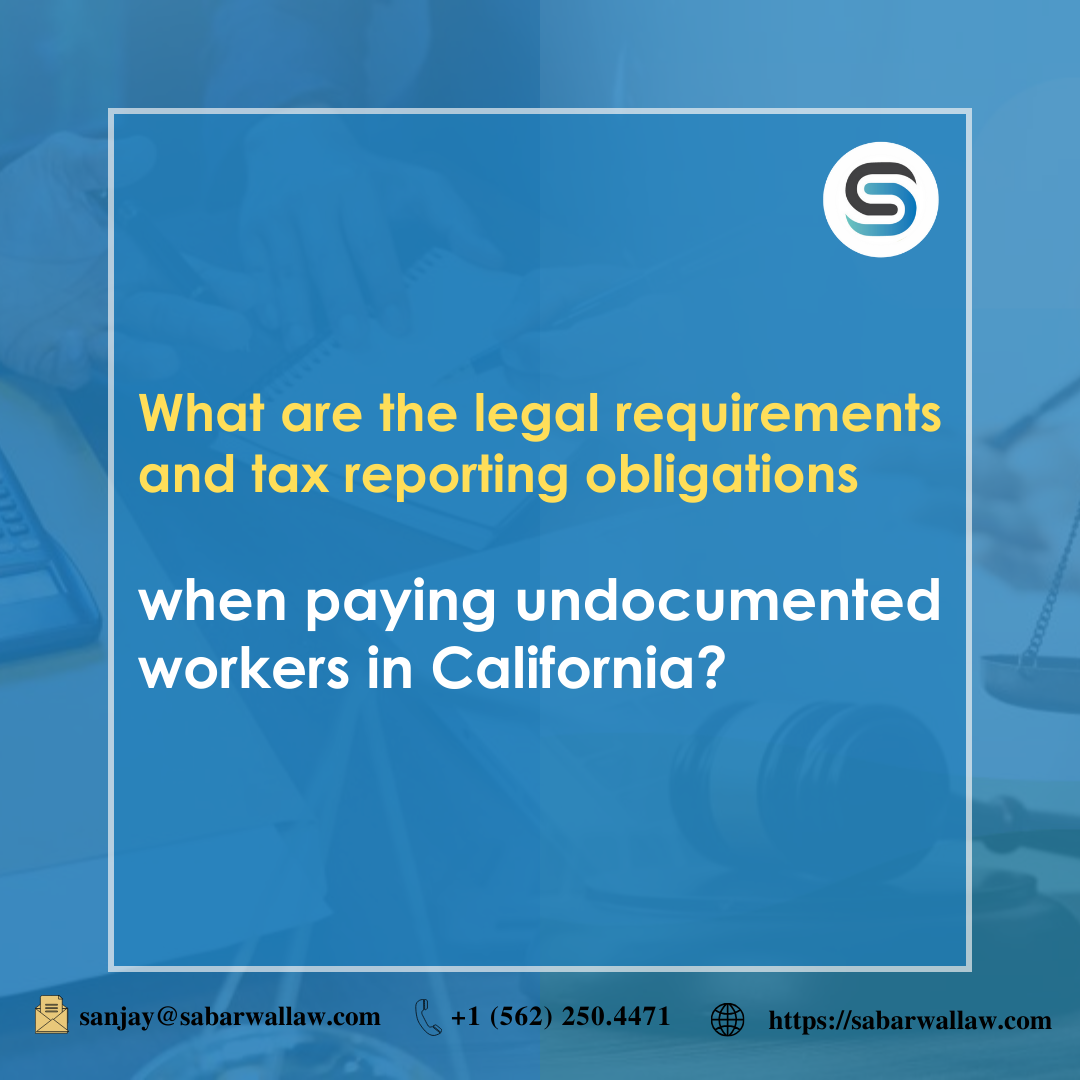
Introduction:
In California, it’s not illegal for employers to pay undocumented workers, but both employers and employees must adhere to federal and state tax laws. This article explores the legal aspects of paying undocumented workers and the tax reporting requirements in California.
- Legal Rights of Undocumented Workers:
- Minimum Wage and Non-Discrimination: California employers cannot use immigration status to pay less than the minimum wage. Undocumented workers are entitled to the same minimum wage as documented workers, which is $15.50 per hour in 2023. Discrimination based on immigration status is prohibited.
- IRCA and Work Authorization: The Immigration Reform and Control Act of 1986 (IRCA) makes it illegal for employers to knowingly hire or continue to employ undocumented workers. Employers must request documents that reasonably appear to be genuine to verify an employee’s identity and work authorization.
- Overtime, Breaks, Tips: Undocumented workers are entitled to overtime pay, breaks, and tips, just like any other worker. Employers who engage in wage theft can face severe penalties, including jail time and fines.
- Protection Against Discrimination: California protects immigrants from discrimination based on various factors, including race, ethnicity, ancestry, national origin, sex, sexual orientation, gender identity, disability, religion, primary language, immigration status, and citizenship.
- DLSE Policy: The Division of Labor Standards Enforcement (DLSE) does not inquire about an employee’s immigration status, ensuring that all workers have rights and protections.
Payment of Wages:
California Labor Code section 1171.5 states that an individual’s immigration status is irrelevant to wage entitlement. The law ensures that all workers, regardless of immigration status, have access to protections, rights, and remedies under state law, except in cases where federal law prohibits reinstatement remedies. It also prohibits inquiries into immigration status in most cases and is declaratory of existing law.
Tax Reporting:
When it comes to tax reporting for undocumented workers, both employees and employers have obligations.
- Employee’s Perspective:
- Undocumented workers must report their income and pay taxes, similar to any other worker.
- To file taxes without a Social Security Number (SSN), they can obtain an Individual Taxpayer Identification Number (ITIN) from the Internal Revenue Service (IRS).
- Employer’s Perspective:
- Employers must withhold federal income taxes, Social Security, and Medicare taxes from their employees’ wages, regardless of their immigration status.
- Employers use Form W-2 to report wages and taxes withheld for each employee, whether they have an SSN or ITIN.
- Employer Verification:
Employers in the U.S. are required to verify the employment eligibility of their workers by completing Form I-9, which includes providing acceptable documents to establish identity and work authorization. This form must be completed for all employees, regardless of their immigration status.
Social Security and Medicare Taxes: Employers must withhold and pay Social Security and Medicare taxes (payroll taxes) for their employees, regardless of their immigration status. Employers report these taxes using Form 941, the Employer’s Quarterly Federal Tax Return.
No Reporting to Immigration Authorities:
Employers are generally not required to report the immigration status of their employees to immigration authorities, as doing so may violate anti-discrimination laws.
Conclusion:
In California, it’s essential to understand the legal rights and obligations of paying undocumented workers. Immigration status should not impact an individual’s entitlement to wages or their protection against discrimination. Employers and employees must fulfill their respective tax obligations, ensuring compliance with the law while respecting the rights of all workers, regardless of immigration status.
Sanjay Sabarwal focuses his practice in the areas of Employment Law, Family Law and Personal Injury Law and provides outstanding service and expertise for your legal right to win cases with personalized attention and insightful counsel. Mr. Sabarwal has been the Co-Owner and House Counsel for Ziba Beauty, member of the American Bar Association, Los Angeles Bar Association, South Asian Bar Association and Orange County Bar Association. He also serves on the Advisory Board for Youth Business Alliance, which connects entrepreneurs to speak at underserved schools in Los Angeles County. He is also a board member for the Artesia Chamber of Commerce. Contact Sanjay at sanjay@sabarwallaw.com or (562) 250-4471.
Watch our YouTube Channel to stay updated on the latest laws here.